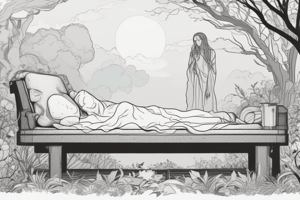Podcast
Questions and Answers
According to Worden's Grief Tasks Model, what is the first task people go through after losing a loved one?
According to Worden's Grief Tasks Model, what is the first task people go through after losing a loved one?
- Reinvest in the reality of a new life
- Acknowledge the pain of the loss
- Adjust to a new environment
- Accept the loss (correct)
What is the second phase of Sander's Five Phases of Bereavement?
What is the second phase of Sander's Five Phases of Bereavement?
- Shock
- Healing
- Awareness of Loss (correct)
- Conservation / Withdrawal
What type of loss is recognized only by the person experiencing it?
What type of loss is recognized only by the person experiencing it?
- Perceived loss (correct)
- Actual loss
- Anticipatory loss
- Psychological loss
What is the goal of therapeutic communication?
What is the goal of therapeutic communication?
What is the 'R' in Rando's 'R' Process Model?
What is the 'R' in Rando's 'R' Process Model?
What type of loss is experienced when a person loses a job?
What type of loss is experienced when a person loses a job?
What is the primary focus of the bereavement model?
What is the primary focus of the bereavement model?
According to Kubler-Ross, what is the last stage of dying?
According to Kubler-Ross, what is the last stage of dying?
In Engel's 6 stages of grief, what is the primary focus of the 'Restitution' stage?
In Engel's 6 stages of grief, what is the primary focus of the 'Restitution' stage?
What is a common outcome of the grief process, according to Engel's model?
What is a common outcome of the grief process, according to Engel's model?
What is the primary focus of mourning?
What is the primary focus of mourning?
What is the primary focus of grief?
What is the primary focus of grief?
Which stage of grief, according to Kubler-Ross, involves refusing to accept reality?
Which stage of grief, according to Kubler-Ross, involves refusing to accept reality?
What is the primary focus of Engel's 6 stages of grief?
What is the primary focus of Engel's 6 stages of grief?
What is the primary focus of the 'agreeing and disagreeing' technique in therapeutic communication?
What is the primary focus of the 'agreeing and disagreeing' technique in therapeutic communication?
According to Bonanno's Trajectories of Bereavement, what is the characteristic of Resilience?
According to Bonanno's Trajectories of Bereavement, what is the characteristic of Resilience?
What is the goal of the 'rebuilding' task in coping with loss?
What is the goal of the 'rebuilding' task in coping with loss?
Which type of awareness involves people being unaware of their own thoughts, feelings, and motivations, as well as those of others?
Which type of awareness involves people being unaware of their own thoughts, feelings, and motivations, as well as those of others?
What is the purpose of 'probing' in therapeutic communication?
What is the purpose of 'probing' in therapeutic communication?
Which of the following is NOT a phase of the helping relationship?
Which of the following is NOT a phase of the helping relationship?
What is the primary focus of the 'testing' technique in therapeutic communication?
What is the primary focus of the 'testing' technique in therapeutic communication?
What is the characteristic of the 'delayed grief' trajectory in Bonanno's Trajectories of Bereavement?
What is the characteristic of the 'delayed grief' trajectory in Bonanno's Trajectories of Bereavement?
Flashcards are hidden until you start studying
Study Notes
Types of Loss
- Actual loss: absence of something and recognized by others
- Perceived loss: absence of something internally only recognized by the person experiencing it
- Psychological losses: personality changes or changes in perception
- Anticipatory loss: anticipating or preparing for loss
- Situational losses: loss of a situation, such as a job, child, or amputation
- Developmental losses: loss of something that is naturally going to be gone, such as life
Sander's Five Phases of Bereavement
- Shock: unable to process the loss
- Awareness of Loss: finally aware of the loss
- Conservation/Withdrawal: isolation or needing time alone
- Healing: learning to live and accept
- Renewal: living independently without the loved one
Worden's Grief Tasks Model
- Accept the loss
- Acknowledge the pain of the loss
- Adjust to a new environment
- Reinvest in the reality of a new life
Rando's "R" Process Model
- Recognizing: acknowledging the loss and coming to terms with the reality of the situation
- Rebuilding: focusing on rebuilding life after the loss, including resuming daily routines, developing new coping mechanisms, and rebuilding social connections
Bonanno's Trajectories of Bereavement
- Resilience: grief is present but does not overwhelm
- Recovery: prolonged period of adjustment after the loss
- Chronic dysfunction: elevated period of depression
- Delayed grief: delay of reacting to the loss
Therapeutic Communication
- Interchange of information between two or more people
- Communication Process: sender, message, and receiver
- Types of communication: 1. Agreeing/Disagreeing, 2. Being defensive, 3. Challenging, 4. Probing, 5. Testing, 6. Rejecting, 7. Changing topics, 8. Unwarranted Reassurance
Types of Awareness
- Closed: unaware of own thoughts, feelings, and motivations, and unaware of others'
- Mutual Pretense: aware of own thoughts and feelings but choose not to disclose
- Exaggerated ("stuck") grief: death, loss, and grief
Phases of the Helping Relationship
- Pre-interaction Phase: emotional pain and disruption to daily life become significant
Kubler-Ross' Stages of Dying
- Denial: refusing to accept reality
- Anger: releasing frustrations
- Bargaining: attempting to change situation
- Depression: reality of loss sinks in
- Acceptance: acceptance that death is inevitable
Engel's 6 Stages of Grief
- Shock & Disbelief: refuses to accept the loss
- Developing Awareness: reality begins to penetrate the consciousness
- Restitution: conducts ritual for mourning
- Resolving Loss: reminiscing the memories
- Idealization: reminding or imagining the lost loved ones
- Outcome: taking it as support/motivation of lost loved ones
Studying That Suits You
Use AI to generate personalized quizzes and flashcards to suit your learning preferences.




